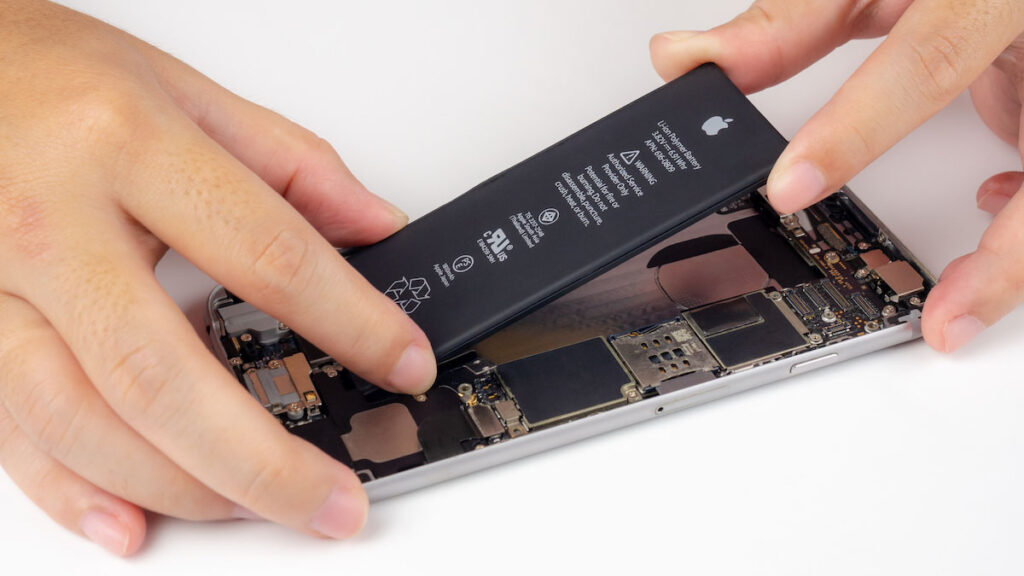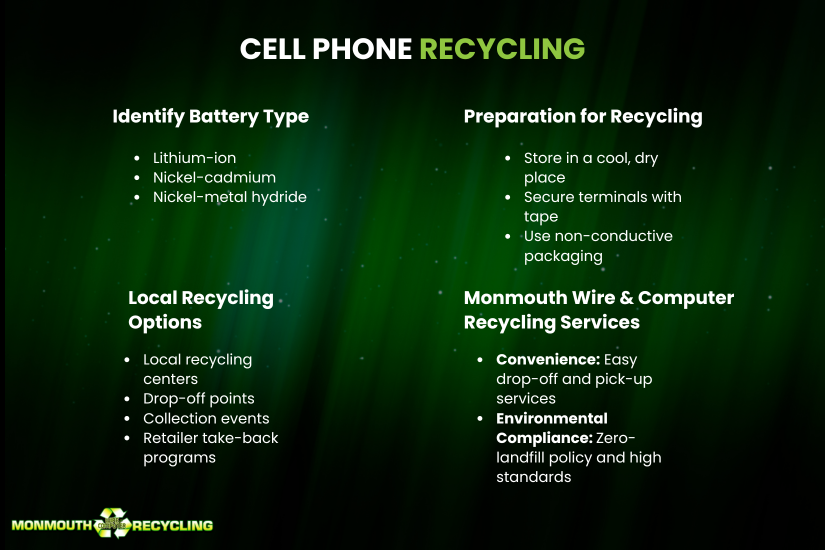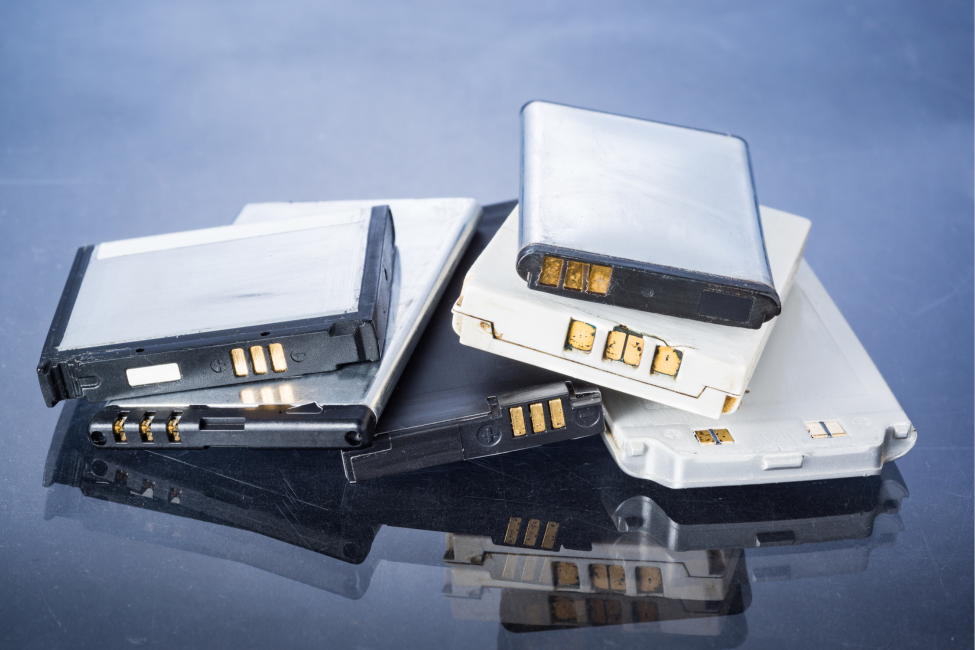Significance of Recycling Cell Phone Batteries
Did you know that approximately 50 million tons of e-waste are generated globally each year? Cell phone batteries significantly contribute to this growing electronic waste. Recycling cell phone batteries is crucial for both environmental and public health. Improper disposal leads to the release of toxic substances like lead, cadmium, and mercury, contaminating soil and water. Additionally, recycling helps recover valuable materials and reduces the need for mining new resources, thus conserving the environment.
Overview of the Guide
In this guide, we will explore the different types of cell phone batteries, the common issues they pose, and the steps you can take to recycle them effectively. We will also highlight the services offered by Monmouth Wire and Computer Recycling to facilitate the recycling process.
Understanding Cell Phone Batteries

Types of Cell Phone Batteries
Understanding the types of cell phone batteries is the first step in the recycling process.
Lithium-ion Batteries
Lithium-ion batteries are the most common type found in modern smartphones. They are lightweight and have a high energy density, making them ideal for portable electronics.
Nickel-Cadmium Batteries
Nickel-cadmium (Ni-Cd) batteries were widely used in older cell phones. They are known for their durability but contain toxic cadmium, making their disposal a significant environmental concern.
Nickel-Metal Hydride Batteries
Nickel-metal hydride (Ni-MH) batteries are less toxic than Ni-Cd batteries and were used in some older phone models. They have been largely replaced by lithium-ion batteries due to better performance and lower environmental impact.
Common Issues with Cell Phone Batteries
Recycling cell phone batteries helps mitigate several common issues associated with their use and disposal.
Battery Degradation
Over time, cell phone batteries degrade and lose their ability to hold a charge. This degradation process results in decreased performance and shorter battery life.
Safety Hazards
Old and damaged cell phone batteries can pose significant safety hazards, including leaks and explosions. Proper recycling prevents these risks by ensuring batteries are handled and processed safely.
By understanding these types and issues, you can better appreciate the importance of recycling cell phone batteries and take informed steps towards proper disposal.
The Environmental Impact of Cell Phone Batteries

Toxic Components: Harmful Substances in Batteries
Cell phone batteries contain several harmful substances, including lead, cadmium, and mercury. These toxic components can leach into the environment if batteries are not disposed of properly, leading to soil and water contamination. Such contamination can have severe effects on ecosystems and human health, making it imperative to recycle cell phone batteries.
E-Waste Statistics: Data on E-Waste Generated by Discarded Batteries
E-waste is one of the fastest-growing waste streams globally. According to recent statistics, discarded batteries contribute significantly to the 50 million tons of e-waste produced annually. Within this massive pile, cell phone batteries represent a substantial portion, highlighting the urgent need for effective recycling programs.
Long-Term Environmental Damage: Consequences of Improper Disposal
Improper disposal of cell phone batteries can lead to long-term environmental damage. The toxic substances within these batteries can remain in the environment for decades, affecting wildlife and human health. Groundwater contamination, soil degradation, and increased greenhouse gas emissions are some of the long-term consequences of not recycling cell phone batteries.
Why Recycle Cell Phone Batteries?
Environmental Benefits: Reducing Landfill Waste and Conserving Resources
Recycling cell phone batteries helps reduce landfill waste and conserves natural resources. By recovering valuable metals like lithium, cobalt, and nickel, recycling reduces the need for mining new materials, thus preserving natural habitats and reducing environmental impact.
Health and Safety: Preventing Toxic Leaks and Fires
Recycling cell phone batteries is crucial for preventing toxic leaks and fires. Old and damaged batteries can leak harmful chemicals or even explode if not handled properly. By ensuring these batteries are recycled correctly, we can mitigate these risks and protect public health.
Economic Advantages: Recovering Valuable Materials and Supporting the Recycling Industry
Recycling cell phone batteries provides significant economic advantages. The process recovers valuable materials that can be reused in manufacturing new products, reducing production costs. Additionally, the recycling industry supports job creation and contributes to the economy, making it a win-win situation for both the environment and the economy.
By understanding the importance and benefits of recycling cell phone batteries, we can take responsible actions to ensure these valuable resources are reused and not wasted.
Legal and Ethical Reasons for Recycling
Regulations and Compliance: Laws Governing Battery Disposal
Recycling cell phone batteries is not only environmentally responsible but also legally mandated in many regions. Laws such as the Resource Conservation and Recovery Act (RCRA) in the United States regulate the disposal of hazardous waste, including batteries. Compliance with these regulations helps prevent environmental damage and ensures safe handling of toxic materials.
Corporate Responsibility: How Manufacturers and Companies Can Contribute
Manufacturers and companies play a crucial role in promoting the recycling of cell phone batteries. By implementing take-back programs, providing recycling information, and designing batteries for easier recycling, corporations can significantly reduce e-waste. Companies are also encouraged to adhere to extended producer responsibility (EPR) policies, which hold them accountable for the entire lifecycle of their products.
Consumer Responsibility: Ethical Reasons for Individual Actions
Consumers have a vital ethical role in recycling cell phone batteries. Proper disposal prevents environmental contamination and health risks. By choosing to recycle, individuals contribute to resource conservation and reduce the burden on landfills. Educating oneself about local recycling options and participating in manufacturer take-back programs are essential steps every consumer should take.
Steps to Recycle Cell Phone Batteries

1. Identify Battery Type: How to Identify and Understand Battery Types
Before recycling cell phone batteries, it is important to identify their type:
- Lithium-ion: Common in modern smartphones, known for high energy density.
- Nickel-cadmium: Found in older phones, contains toxic cadmium.
- Nickel-metal hydride: Used in some older models, less toxic than nickel-cadmium.
2. Preparation for Recycling: Safe Handling and Storage Tips
Proper preparation is crucial for safe recycling:
- Handle with Care: Avoid puncturing or damaging batteries.
- Storage: Store in a cool, dry place, ideally in a plastic bag or container to prevent leaks.
3. Finding Local Recycling Options
Explore local options to recycle cell phone batteries:
- Local Recycling Centers: Check local facilities that accept batteries.
- Drop-Off Points and Collection Events: Utilize community collection events or designated drop-off points.
- Retailer Take-Back Programs: Many electronics retailers offer battery recycling services.
4. Manufacturer Programs: Take-Back and Recycling Programs by Major Manufacturers
Many phone manufacturers offer recycling programs:
- Apple: Provides recycling for its devices and batteries.
- Samsung: Offers a take-back program for old devices and batteries.
- Other Manufacturers: Check specific programs offered by different brands.
5. Monmouth Wire and Computer Recycling Services
Monmouth Wire and Computer Recycling provides comprehensive services to recycle cell phone batteries:
- Convenience: User-friendly drop-off and pick-up services make recycling easy and accessible.
- Environmental Compliance: Commitment to a zero-landfill policy and adherence to high industry standards ensure responsible recycling.
By following these steps and utilizing available resources, you can effectively recycle cell phone batteries and contribute to a healthier environment.
How to Safely Dispose of Cell Phone Batteries
Do’s and Don’ts: Guidelines for Safe Disposal
To safely recycle cell phone batteries, always store them in a cool, dry place, and avoid puncturing or damaging them. Never dispose of them in regular trash as this can lead to environmental contamination and safety hazards.
Packaging Tips: Proper Packaging to Prevent Leaks and Fires
When preparing cell phone batteries for recycling, use non-conductive materials like plastic bags or original packaging. Secure the terminals with electrical tape to prevent short circuits and potential fires during transport.
Transporting Batteries: Safety Measures During Transportation
Ensure that cell phone batteries are transported in a stable, secure manner to avoid damage. Keep them away from other metal objects and consider using specialized battery recycling containers for added safety.
How to Encourage Battery Recycling in Your Community
Community Programs: Organizing Local Recycling Drives
Organize local recycling drives by collaborating with community centers, schools, and local businesses. These events can significantly increase awareness and participation in recycling cell phone batteries.
Education and Awareness: Promoting Recycling Through Education
Educate your community about the benefits and methods of recycling cell phone batteries through workshops, flyers, and social media campaigns. Awareness is key to encouraging proper recycling habits.
Partnerships: Collaborating with Local Businesses and Organizations
Partner with local businesses and environmental organizations to set up convenient recycling drop-off points and promote battery recycling initiatives. Collaboration can amplify the impact of your efforts.
Recycling cell phone batteries is essential for protecting our environment and health. By following the proper steps and utilizing services like those offered by Monmouth Wire and Computer Recycling, you can ensure safe and responsible disposal. Contact Monmouth Wire and Computer Recycling today to take the first step in recycling your old phone batteries effectively and sustainably.

